|
Featured picture tools: |
These featured pictures, as scheduled below, appeared as the picture of the day (POTD) on the English Wikipedia's Main Page in November 2016. Individual sections for each day on this page can be linked to with the day number as the anchor name (e.g. [[Wikipedia:Picture of the day/November 2016#1]] for November 1).
You can add an automatically updating POTD template to your user page using {{Pic of the day}} (version with blurb) or {{POTD}} (version without blurb). For instructions on how to make custom POTD layouts, see Wikipedia:Picture of the day.Purge server cache
November 1

|
A yellow-billed shrike (Corvinella corvina) with its prey. The yellow-billed shrike is a common resident breeding bird in tropical Africa, from Senegal east to Uganda, and locally in westernmost Kenya. It frequents forest and other habitats with trees. Although it generally feeds on insects, this shrike may hunt larger prey as well. Photograph: Sumeet Moghe
Recently featured:
|
November 2
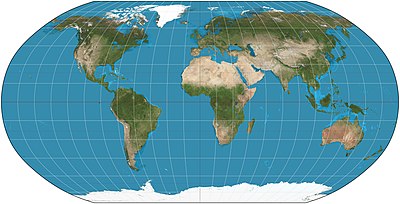
|
The Robinson projection is a map projection of a world map which shows the entire world at once. It was devised by Arthur H. Robinson in 1963 in response to an appeal from the Rand McNally company for a good compromise to the problem of readily showing the whole globe as a flat image. The company has used the projection since that time, and the National Geographic Society used the Robinson from 1988 to 1998. Map: Strebe, using Geocart
Recently featured:
|
November 3

|
A female Telamonia dimidiata in the Lalbagh Botanical Gardens, Bangalore, India. This jumping spider is found in various Asian tropical rain forests. Females can reach a body length of 9–11 mm (0.35–0.43 in), while males can reach a length of 8–9 mm (0.31–0.35 in). Photograph: Muhammad Mahdi Karim
Recently featured:
|
November 4

|
Midsummer Eve Bonfire on Skagen Beach is a 1906 painting by P.S. Krøyer. The large work, which took several years to complete, shows many of the artists in the group known as the Skagen Painters as well as influential members of Skagen's local community. Although Krøyer was not satisfied with the work, considering it too dark, the painting is now viewed as one of the most important in the Skagens Museum collection. Painting: P. S. Krøyer
Recently featured:
|
November 5

|
A rescue exercise being undertaken by the Royal Canadian Air Force and the Canadian Coast Guard. Formed in 1962, the Canadian Coast Guard is a Special Operating Agency within Fisheries and Oceans Canada. It is headquartered in Ottawa, Ontario. Unlike some other coast guard organizations, it does not have naval or law enforcement responsibilities. Photograph: Antoine Letarte
Recently featured:
|
November 6

|
Mõdriku Manor is an estate in Mõdriku, Lääne-Viru County, Estonia. Attested since the 15th century, it has been used by numerous families and schools. The main building, shown here, was built at the end of the 18th century. Photograph: Ivar Leidus
Recently featured:
|
November 7

|
One "hard dollar", printed as part of a confidence trick by Gregor MacGregor (1786–1845). From 1821 to 1837, MacGregor attempted to draw British and French investors and settlers to "Poyais", a fictional Central American territory he claimed to rule as "Cazique". Hundreds invested their savings in supposed Poyaisian government bonds and land certificates, while about 250 emigrated to MacGregor's invented country in 1822–23 to find only an untouched jungle; over half of them died. MacGregor's Poyais scheme has been called one of the most brazen confidence tricks in history. Banknote: Gregor MacGregor and W.H. Lizars; image courtesy of the National Numismatic Collection
Recently featured:
|
November 8

|
Ivan Goremykin (1839–1917) was a Russian prime minister during World War I. A politician with archconservative views, after some time in the Ministry of Justice, he transferred to the Ministry of the Interior in 1891. He held the rank of prime minister from May to July 1906 and again from 1914 to 1916; during both terms his effectiveness was strongly limited by opposition from the State Duma. In the aftermath of the October Revolution, Goremykin was recognized as a member of the Tsarist government and killed by a street mob. Photograph: Unknown; restoration: Adam Cuerden
Recently featured:
|
November 9

|
Niagara Falls, from the American Side is a painting by the American artist Frederic Edwin Church (1826–1900). Completed in 1867, and based on preliminary sketches made by the artist at Niagara Falls and on a sepia photograph, it is the third of a series of paintings Church made of this famous landmark. The painting is now in the collection of the Scottish National Gallery. Painting: Frederic Edwin Church
Recently featured:
|
November 10

|
Leotia lubrica is a species of fungus in the family Leotiaceae. The species produces small fruit bodies up to 6 cm (2.4 in) in height, featuring a "head" and a stalk. Ochre tinted with olive-green in colour, the heads are irregularly shaped, while the stalk, of a similar colour, attaches them to the ground. Photograph: Holger Krisp
Recently featured:
|
November 11

|
The memorial tower at the Netherlands American Cemetery, a World War II war cemetery in Margraten, the Netherlands. Administered by the American Battle Monuments Commission, the cemetery holds 8,301 graves in an area of 65.5 acres (26.5 ha). The site includes a reflecting pool, museum, and a Court of Honor, the walls of which contain the Tablets of the Missing, on which are recorded the names of 1,722 American missing. Photograph: Andrew Shiva
Recently featured:
|
November 12
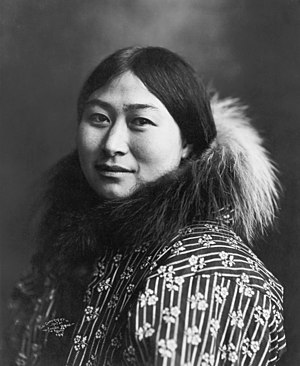
|
A photograph of an Iñupiat woman named Nowadluk (Nora) Ootenna. Ootenna was a popular subject for Alaskan photographers in the early 20th century. Her husband, George Ootenna, worked as a reindeer herder. Traditionally, in Inuit communities, women played a crucial role in group survival, and their responsibilities were considered equally important to the men's. Consequently, women were given due respect, albeit not an equal share of influence or power. Recent modernization and urbanization has transformed traditional Inuit culture and influenced the role of women within the culture, having both positive and negative impacts on the overall well-being of Inuit women. Photograph: Lomen Bros; restoration: Chris Woodrich; Papa Lima Whiskey 2
Recently featured:
|
November 13
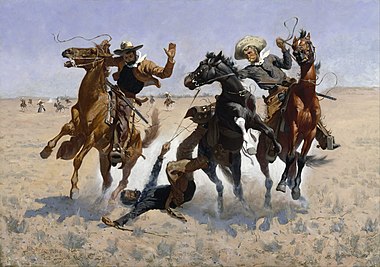
|
Aiding a Comrade, an oil painting on canvas completed by Frederic Remington (1861–1909) in 1890, the year of his first solo exhibition. Born in Canton, New York, Remington took up drawing soldiers and cowboys at a young age. After making his first journey west, to Montana and Kansas, Remington used his experiences to publish his first work. Over the years Remington was a painter, illustrator, sculptor, and writer, specializing in depictions of the Old American West, specifically images of cowboys, American Indians, and the U.S. Cavalry. Painting: Frederic Remington
Recently featured:
|
November 14

|
Our English Coasts is an oil-on-canvas painting completed by the British Pre-Raphaelite painter William Holman Hunt in 1852. The painting was commissioned by Charles Theobald Maud and depicts a flock of sheep on the coast of Sussex, at a scenic location on the cliffs at Fairlight Glen. In 1946 Our English Coasts was acquired by the Tate Gallery through the Art Fund. Painting: William Holman Hunt
Recently featured:
|
November 15

|
The great tit (Parus major) is a passerine bird in the tit family Paridae. It is a widespread and common species throughout Europe, the Middle East, Central and Northern Asia, and parts of North Africa; this female was photographed in Lancashire. Most great tits do not migrate except in extremely harsh winters. Photograph: Francis C. Franklin
Recently featured:
|
November 16

|
Bangles on display in Bangalore, India. These rigid bracelets are usually made from metal, wood, or plastic and are traditionally worn by women in India, Nepal, Pakistan, and Bangladesh. In India, it is a common tradition to see a new bride wearing glass bangles at her wedding and the honeymoon will end when the last bangle breaks. Photograph: Muhammad Mahdi Karim
Recently featured:
|
November 17

|
|
Cymon and Iphigenia is an oil on canvas painting by Frederic Leighton, that was first exhibited at the Royal Academy of Arts, London, in 1884. Based on the story of Iphigenia and her transformation of the lout Cymon into a veritable polymath, the painting has been described as emphasizing "the transforming power of beauty." The Art Gallery of New South Wales in Sydney, Australia, purchased this painting at a Christie's auction in 1976. Painting: Frederic Leighton
Recently featured:
|
November 18

|
The nave and sanctuary at Eibingen Abbey, near Rüdesheim in Hesse, Germany. The first community of Benedictine nuns in Eibingen was established in 1165 by Hildegard von Bingen; the present community was established by Charles, 6th Prince of Löwenstein-Wertheim-Rosenberg, in 1904, and re-settled from St. Gabriel's Abbey, Bertholdstein. This church dates to the early 20th century. Photograph: DXR
Recently featured:
|
November 19

|
Oecophylla longinoda, a species of weaver ant found in the forested regions of tropical Africa. Weaver ants are arboreal and known for their unique nest building behaviour, in which workers construct nests by weaving together leaves using larval silk. These highly territorial ants live in colonies that can consist of more than a hundred nests spanning numerous trees and contain more than half a million workers. Like many other ant species, weaver ants prey on small insects and supplement their diet with carbohydrate-rich honeydew excreted by small insects. Photograph: Muhammad Mahdi Karim
Recently featured:
|
November 20

|
A self portrait by Alexander Roslin (1718–1793) depicting the artist with his wife, Marie-Suzanne (1734–1772). Roslin was a Swedish portrait painter who spent most of his career in France. His works, which primarily depicted members of aristocratic families, have been described as exemplifying Rococo, and combining insightful psychological portrayal with a skillful representation of fabrics and jewels. Painting: Alexander Roslin
Recently featured:
|
November 21

|
A facsimile reproduction of the Bixby letter, a brief, consoling message believed to have been written by President Abraham Lincoln in November 1864 to Lydia Parker Bixby, a widow living in Boston, Massachusetts, who was thought to have lost five sons in the Union Army during the American Civil War. Along with the Gettysburg Address and his second inaugural address, the letter has been praised as one of Lincoln's finest written works and is often reproduced in memorials, media, and print. Controversy surrounds the recipient, the fate of her sons, and the authorship of the letter. Bixby's character has been questioned (including rumored Confederate sympathies), at least two of her sons survived the war, and the letter was possibly written by Lincoln's assistant private secretary, John Hay. Letter: Signed Abraham Lincoln; facsimile: Huber's Museum and Michael F. Tobin
Recently featured:
|
November 22

|
A black-and-white photographic mosaic depicting the comet 67P/Churyumov–Gerasimenko, as photographed by the probe Rosetta. This Jupiter-family comet, which was originally from the Kuiper belt, is about 4.3 km (2.7 mi) across, has a current orbital period of 6.45 years, a rotation period of approximately 12.4 hours, and a maximum velocity of 135,000 km/h (38 km/s; 84,000 mph). It was first observed on photographic plates in 1969 by Soviet astronomers Klim Churyumov and Svetlana Gerasimenko, after whom it is named. Photograph: ESA/Rosetta/NAVCAM
Recently featured:
|
November 23

|
Franklin Pierce (1804–1869) was the 14th President of the United States (1853–57). A northern Democrat who saw the abolitionist movement as a fundamental threat to the unity of the nation, Pierce undertook polarizing actions in championing and signing the Kansas–Nebraska Act and enforcing the Fugitive Slave Act. His actions impacted his once high popularity and failed to stem intersectional conflict, setting the stage for Southern secession. US historians and other political commentators generally rank Pierce's presidency as among the worst. Photograph: Mathew Brady; restoration: Adam Cuerden
Recently featured:
|
November 24
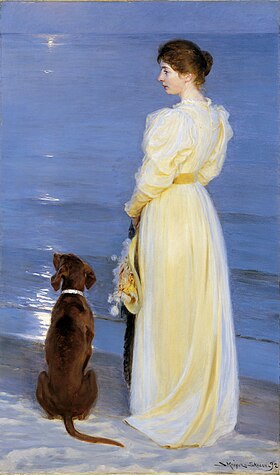
|
Summer Evening at Skagen. The Artist's Wife and Dog by the Shore is a 1892 painting by P.S. Krøyer, one of the best known of the artistic community known as the Skagen Painters. The work shows Marie Krøyer, the artist's wife, standing on the beach at Skagen with their dog Rap at her side and the moonlight reflected in the sea. The painting was first exhibited at Den Frie Udstilling in 1893, where it received mixed reviews. It has been held at the Skagens Museum since 1937. Painting: P.S. Krøyer
Recently featured:
|
November 25

|
Emmanuel College is a constituent college of the University of Cambridge. The college was founded by Sir Walter Mildmay, Chancellor of the Exchequer to Elizabeth I, in 1584 on the site of a Dominican friary. Since 1998, Emmanuel has consistently been among the top five colleges in the Tompkins Table. It is one of the wealthier colleges at Cambridge, with a financial endowment of approximately £105m and net assets of £150m in 2012. Photograph: David Iliff |
November 26

|
An exchequer note, with a face value of five pounds, issued by the exchequer of the Kingdom of England under William III. This bill is dated 6 August 1697, one year after the introduction of such notes, and a tax or "aid" of 3 shillings is chargeable on it. Exchequer notes paid interest for loans made to the government. Banknote: Exchequer of the Kingdom of England (image courtesy of the National Numismatic Collection) |
November 27

|
British Formula One racing driver Lewis Hamilton (b. 1985), shown during the 2016 Monaco Grand Prix. Hamilton, a racer for Mercedes, began the race with a history of losses on the Monaco track. However, despite rainy conditions he finished the Grand Prix in first place, with a time of 1:59:29.133. Photograph: Andrew Locking |
November 28

|
An adult Legong Bapang Saba dancer from Sanata Dharma University's Sekar Jepun Balinese dance troupe. Legong, which can be traced to the 19th century, is a narrative dance performed to gamelan music. Although the fifteen types of legong have traditionally been performed by prepubescent girls, today the dance may also be performed by adult women and men in women's costumes. Photograph: Chris Woodrich
Recently featured:
|
November 29

|
A barn owl (Tyto alba) returning to its falconer's hand. Owls are relatively uncommon in falconry compared to hawks and falcons, and training them is considered difficult. Photograph: Carlos Delgado
Recently featured:
|
November 30
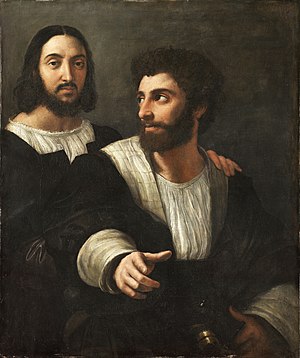
|
Self-Portrait with a Friend is a painting by the Italian High Renaissance painter Raphael that dates to 1518–1520 and is held in the Louvre Museum of Paris, France. It is generally held to depict the painter (left) with an unidentified friend; suggestions for the other sitter's identity include Polidoro da Caravaggio, Giulio Romano, and Giovanni Battista Branconio. Painting: Raphael
Recently featured:
|
Picture of the day archives and future dates